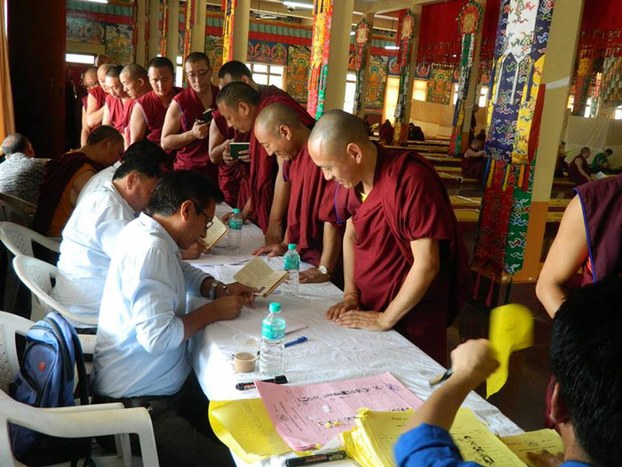India: Tibetans vote for Sikyong to head exile government
| Publisher | Radio Free Asia |
| Publication Date | 21 March 2016 |
| Cite as | Radio Free Asia, India: Tibetans vote for Sikyong to head exile government, 21 March 2016, available at: https://www.refworld.org/docid/570f4275e.html [accessed 19 May 2023] |
| Disclaimer | This is not a UNHCR publication. UNHCR is not responsible for, nor does it necessarily endorse, its content. Any views expressed are solely those of the author or publisher and do not necessarily reflect those of UNHCR, the United Nations or its Member States. |
2016-03-21
 Buddhist monks line up in Bylakuppe, India, to cast their votes for a Tibetan government-in-exile, March 20, 2016. RFA
Buddhist monks line up in Bylakuppe, India, to cast their votes for a Tibetan government-in-exile, March 20, 2016. RFA
Tibet's diaspora chose a new political leader on Sunday as tens of thousands cast ballots for a government-in-exile.
The Tibet Sun and Phayul.com reported on Monday that incumbent Lobsang Sangay has a substantial lead over parliamentary speaker Penpa Tsering in the race for Sikyong, or the top leader of the government-in-exile. The official election results are scheduled to be released on April 27.
The Sikyong is responsible for political and diplomatic decisions for the Dharamsala, India-based government-in-exile known as the Central Tibetan Administration.
Sangay's re-election comes at a critical time for Tibetans as the 80-year-old Dalai Lama scales back his involvement in the administration. In 2011, he announced that he was handing over his political authority to a democratically elected government.
The election also comes at a critical time for the relationship Tibet has with China. Beijing has ruled Tibet directly ever since Chinese troops marched into the formerly self-governing Himalayan region in 1950.
"The election for Sikyong has been, for some people at least, an exercise in frustration," said Elliot Sperling, professor emeritus of Tibetan Studies at Indiana University.
"In the end, the Tibetan voting public has been left with two candidates who differ little, if at all, on their overall positions: they support Tibet being a part of China and have little concrete to say about actually dealing with China."
Middle Way Approach
The Dalai Lama fled Tibet and went into exile in India in the midst of a failed national uprising in 1959, and he is reviled by Chinese leaders as a dangerous separatist who seeks to split Tibetan areas from Beijing's rule.
In what he calls a Middle Way Approach, though, the Dalai Lama himself says that he seeks only a "meaningful autonomy" for Tibet as a part of China, with protections for the region's language, religion, and culture.
With both Sikyong candidates backing the Middle Way, the election for the 45 seats in the parliament, or chitue, may better reflect the split among Tibetans over their relationship with Beijing.
"Some voters are turning to the chitue as a place in which at least some candidates are standing against the idea of legitimizing the incorporation of Tibet into the People's Republic of China," Sperling said. "These campaigns have received less attention, so it will be interesting to see how they turn out."
In interviews on Sunday, Tibetan voters expressed enthusiasm about the election.
"Firstly, I consider the selection and election of the Tibetan Sikyong to be very important," one voter in Bylakuppe, India, told RFA's Tibetan Service. "Secondly, I consider it important to elect good people as members of the Tibetan parliament-in-exile."
Said a female voter: "The objective for which I have come here today is to hope a woman could stand in the election, so I cast my vote for a woman candidate [for parliament], hoping it will encourage as many women to run as possible."
Policy or personality
While the independence question forms a powerful undercurrent to the policy debates in the exile community, the 2016 elections focused more on personality than policy, said Robbie Barnett, director of the Modern Tibetan Studies Program at Columbia University.
"The election process this time has increasingly come down to conflicts over personality and character," said Barnett. "I think this is a legacy of the long debate over the 'middle way' and independence, deeply emotive topics which have tended to divert energy and attention from the everyday issues of political reform, development, education and so on."
The election may have problems, but that hasn't stopped thousands from going to the various polling places where exile Tibetans congregate all over the world.
"On the positive side, this election has shown that any leader, even if he or she has impressive credentials or an important title, can and must be assessed on the basis of their record," Barnett explained.
"After this people will ask harder questions of future candidates, and will discuss the details of each candidate's words, practical achievements, and policies."
Or as one voter put it: "To vote today is an individual right. That right should be exercised. It is important to elect a good man. I have chosen that good man."
Reported by RFA's Tibetan Service. With additional reporting by Brooks Boliek and Richard Finney. Translated by Benpa Topgyal. Written in English by Brooks Boliek.
Link to original story on RFA website
